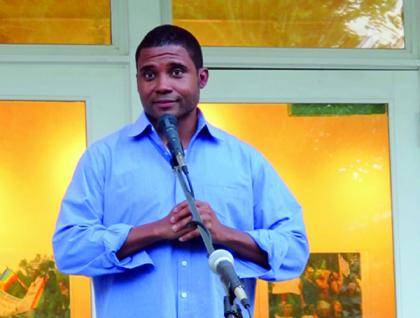
In the Spring, actor and playwright Mike Wiley will teach a class at Duke called "Acting Out Black History," in which he and students will tackle African-American history through various methods of storytelling.
Wiley, who is known for his one-man plays about key African-American historical figures such as Jackie Robinson and Emmett Till, discussed the class with Duke Today. The following is an edited transcript of that conversation.
Your upcoming class is called "Acting out Black History," but it isn't an acting class. What should students expect from it, and do they need any acting experience?
"Acting Out Black History" focuses on my own 15 years of writing about and performing black history. So the class is open to creative minds interested in new ways to tell the stories of Africans in America and abroad, specifically for listening or viewing audiences. We will wrestle with the traditional narratives of black history to give voice to new methods of storytelling for the stage or screen. I approach my performance and writing style in non-traditional ways, and I believe others can learn from that and perhaps even improve upon my methods. The future is bright for this genre of documentary.
What, specifically, might these innovative new ways of storytelling be? And how much will student interests/ideas drive the class project?
I'm a child of 80's Hip Hop, an earlier, more creative time in that genre of music in my opinion. My work tends to be influenced by that. I was affected by the way certain artists would mix linear stories into non-linear storytelling, layering it with shards and snippets from 70's rhythm and blues all the while commenting on society.
I tend to take what seems like a straightforward narrative that we might all be familiar with and weave in little known facts using journals, interviews or news clippings. To do this I turn quotes into dialogue and first-person accounts into monologues. I like playing with juxtaposition and irony to point out the multiple angles within one story. All avenues to the truth are open in my work.
What can a student learn about a historic moment or person through creating a play or documentary that they might not through a more traditional class involving lectures, texts, etc?
Empathy.
Students will contribute to your upcoming one-person play about writer James Baldwin. Why is he an important figure to study in this way? And what might students learn about him through this exercise that they might not otherwise?
The Baldwin project is there to give the class a springboard to leap from. In addition to whatever interests the students bring to the table, the Baldwin work will serve as a touchstone to the methods of storytelling, history and commentary. Baldwin's stories and quotes regarding race in 20th century American society and politics are quite profound. In terms of the class project the students will have somewhat free rein to cull together what interests them in Baldwin's world. As they bring in their research we will experiment with creating a solo play about the man himself. This will give us a deeper understanding of who James Baldwin was and how he'd behave if given an hour today to speak.